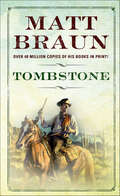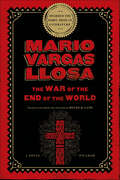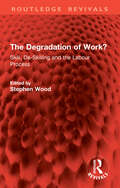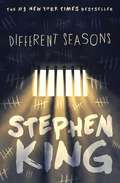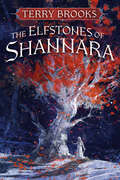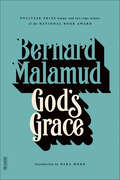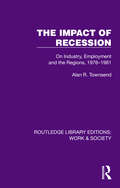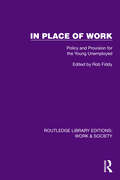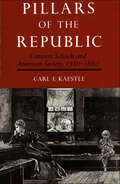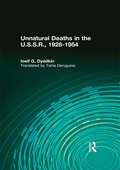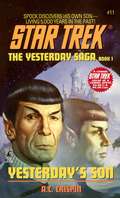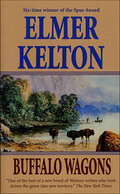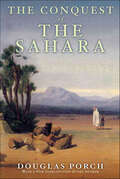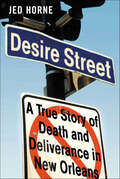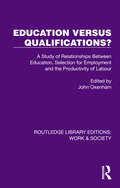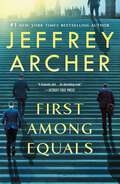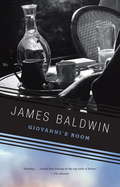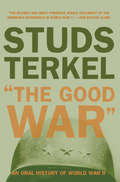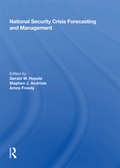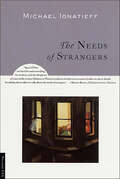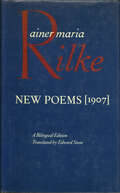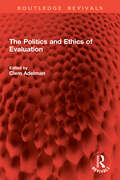- Table View
- List View
Tombstone: A Luke Starbuck Novel (The Luke Starbuck Novels)
by Matt Braun"MATT BRAUN IS A MASTER STORYTELLER OF FRONTIER HISTORY." —Elmer KeltonOn a fierce frontierIn 1878, a struggling prospector found silver in the jagged mountains of Arizona. Within a year the town of Tombstone was filling up with merchants, tradesmen, gamblers, whores, gunslingers…and, eventually, Wyatt Earp.One town earned a legend of its own…When Earp arrives in Tombstone, nothing is ever the same. Along with Doc Holliday and a band of thieves, he turns the Arizona territory into his personal stomping grounds—until Wells Fargo puts an end to a string of savage stage robberies. With the legend of the OK Corral shoot-out fanning out across the frontier, private detective Luke Starbuck is sent to Tombstone on a mission: To learn the truth about Wyatt Earp. And to lay his legend to rest…"BRAUN IS ONE OF THE BEST!"—Don Coldsmith, author of the Spanish Bit series
Unemployment (Routledge Library Editions: Work & Society)
by Bernard CrickThis book was originally published in 1981 at a time when mass unemployment had returned to the United Kingdom. Now reissued with a new Preface by the author's literary executor, the essays in this volume discuss in detail the damage that was being done to the community and the economy at national and regional levels as a result of government policy. There are chapters on the political and economic aspects of the problem, on the comparison with the inter-war years, on youth unemployment and on unemployment in each of the regions worst affected. The collection as a whole provides an authoritative overview of a central political issue of the late 20th Century but one which still has resonance today as the post-Covid, post-Brexit UK economy teeters on the edge of recession.
The War of the End of the World: A Novel
by Mario Vargas LlosaDeep within the remote backlands of nineteenth-century Brazil lies Canudos, home to all the damned of the earth: prostitutes, bandits, beggars, and every kind of outcast. It is a place where history and civilization have been wiped away. There is no money, no taxation, no marriage, no census. Canudos is a cauldron for the revolutionary spirit in its purest form, a state with all the potential for a true, libertarian paradise--and one the Brazilian government is determined to crush at any cost. In perhaps his most ambitious and tragic novel, Mario Vargas Llosa tells his own version of the real story of Canudos, inhabiting characters on both sides of the massive, cataclysmic battle between the society and government troops. The resulting novel is a fable of Latin American revolutionary history, an unforgettable story of passion, violence, and the devastation that follows from fanaticism.
The Degradation of Work?: Skill, De-Skilling and the Labour Process (Routledge Revivals)
by Stephen WoodOriginally published in 1982 and now reissued with a new Preface by Stephen Wood the contributors of this book discuss the issues surrounding the organization of labour. They use insights from industrial sociology, historical research and Marxist-Feminist debates. In particular they stress that work organization cannot be seen simply as a reflection of the strategy of an omniscient management; any examination of it must involve product and labour markets, technology, trade unionism and, above all, the way in which production systems are jointly created out of the interrelationship between management and workforces. The Degradation of Work? asks if there has been a general de-skilling and routinization of jobs and if ‘skilled’ jobs are really any different from semi-skilled or unskilled ones.
Different Seasons (Signet Ser.)
by Stephen KingIncludes the stories &“The Body&” and &“Rita Hayworth and Shawshank Redemption&”—set in the fictional town of Castle Rock, Maine A &“hypnotic&” (The New York Times Book Review) collection of four novellas—including the inspirations behind the films Stand By Me and The Shawshank Redemption—from Stephen King, bound together by the changing of seasons, each taking on the theme of a journey with strikingly different tones and characters.This gripping collection begins with &“Rita Hayworth and the Shawshank Redemption,&” in which an unjustly imprisoned convict seeks a strange and startling revenge—the basis for the Best Picture Academy Award-nominee The Shawshank Redemption. Next is &“Apt Pupil,&” the inspiration for the film of the same name about top high school student Todd Bowden and his obsession with the dark and deadly past of an older man in town. In &“The Body,&” four rambunctious young boys plunge through the façade of a small town and come face-to-face with life, death, and intimations of their own mortality. This novella became the movie Stand By Me. Finally, a disgraced woman is determined to triumph over death in &“The Breathing Method.&” &“The wondrous readability of his work, as well as the instant sense of communication with his characters, are what make Stephen King the consummate storyteller that he is,&” hailed the Houston Chronicle about Different Seasons.
The Elfstones of Shannara (The Sword of Shannara #2)
by Terry BrooksONE OF THE MOST POPULAR FANTASY TALES OF ALL TIME. NOW AN EPIC TV SERIES. Thousands of years after the destruction of the age of man an d science, new races and magic now rule the world, but an imminent danger threatens. A horde of evil Demons is beginning to escape and bring death upon the land. Only Wil Ohmsford, the last of the Shannara bloodline, has the power to guard the Elven Princess Amberle on a perilous quest to the save the world, while the leader of the Demon force aims to stop their mission at any cost. Praise for Terry Brooks &“Shannara was one of my favorite fictional worlds growing up, and I look forward to many return trips.&”—Karen Russell, author of Swamplandia! &“If Tolkien is the grandfather of modern fantasy, Terry Brooks is its favorite uncle.&”—Peter V. Brett, author of The Skull Throne &“A great storyteller, Terry Brooks creates rich epics filled with mystery, magic, and memorable characters.&”—Christopher Paolini, author of Eragon
God's Grace: A Novel (Fsg Classics Ser.)
by Bernard MalamudGod's Grace (1982), Bernard Malamud's last novel, is a modern-day dystopian fantasy, set in a time after a thermonuclear war prompts a second flood -- a radical departure from Malamud's previous fiction. The novel's protagonist is paleolosist Calvin Cohn, who had been attending to his work at the bottom of the ocean when the Devastation struck, and who alone survived. This rabbi's son -- a "marginal error" -- finds himself shipwrecked with an experimental chimpanzee capable of speech, to whom he gives the name Buz. Soon other creatures appear on their island-baboons, chimps, five apes, and a lone gorilla. Cohn works hard to make it possible for God to love His creation again, and his hopes increase as he encounters the unknown and the unforeseen in this strange new world. With God's Grace, Malamud took a great risk, and it paid off. The novel's fresh and pervasive humor, narrative ingenuity, and tragic sense of the human condition make it one of Malamud's most extraordinary books. "Is he an American Master? Of course. He not only wrote in the American language, he augmented it with fresh plasticity, he shaped our English into startling new configurations." --Cynthia Ozick
The Impact of Recession: On Industry, Employment and the Regions, 1976–1981 (Routledge Library Editions: Work & Society)
by Alan R. TownsendRich industrialised countries entered the 1980s with unemployment higher than before the Second World War. Britain experienced the impact of recession more immediately and sharply; over one million factory jobs were lost. Originally published in 1983 and now reissued with a new Preface by the author, this book points to the industries, corporations and places in which job losses occurred between 1976 and 1981. The Impact of Recession opens with an examination of national trends which includes the post-war rise and fall of manufacturing employment and the fashionable concept of ‘de-industrialisation’. It considers the possible and actual roles of leading industrial corporations in distributing decline to different areas. The effects of the crisis on individual regions is examined in detail and the author emphasizes that it is not only the traditional areas of recession such as the North East that were affected, but also the manufacturing centres of the Midlands and the normally prosperous South East. Alternative explanations of the distribution of employment are examined and the adequacy of previous explanations of unequal growth and decline are questioned. The book also looks at the extent to which New Towns have suffered in the crisis and whether the well-established consensus about the merits of regional planning has been broken down by the recession.
In Place of Work: Policy and Provision for the Young Unemployed (Routledge Library Editions: Work & Society)
by Rob FiddyOriginally published in 1983, this book promotes understanding of the provision for the young unemployed in Britain in the 1980s, both in policy and practice, through a series of research-based papers. Various strategies are analyzed which were available to policy makers. The place of black youth amongst the unemployed, and the connections between unemployment and street violence are also discussed. The book focusses on Britain but high levels of youth unemployment were found all over the Western world during that period.
Pillars of the Republic: Common Schools and American Society, 1780–1860 (American Century)
by Carl F. KaestlePillars of the Republic is a pioneering study of common-school development in the years before the Civil War. Public acceptance of state school systems, Kaestle argues, was encouraged by the people's commitment to republican government, by their trust in Protestant values, and by the development of capitalism. The author also examines the opposition to the Founding Fathers' educational ideas and shows what effects these had on our school system.
Unnatural Deaths in the U.S.S.R.
by Iosif G. DyadkinThis astonishing and sobering account of government- and war-induced civilian deaths in the Soviet Union calculates that Soviet loss of life between 1928 and 1954 was far higher than Western ex-perts have ever believed. Applying mathematical techniques to Soviet demographic statistics, Dyadkin shows that Stalinist repres-sion and World War II must have taken the lives of between 43 and 52 million Soviet citizens.In the first period, 1929-36, one of collectivization, Stalin control-led and eliminated classes; during the Great Purge of 1937-38, mil-lions of Communist party members and bureaucrats were executed, and then the purge extended into the Red Army. Dyadkin shows that World War II took close to 30 million lives and that during 1950-53 another 450,000 died in prison camps.
Yesterday's Son: The Entropy Effect; The Covenant Of The Crown; Yesterday's Son; The Idic Epidemic (Star Trek: The Original Series #11)
by A.C. CrispinThe Romulans attack the planet Gateway, where Federation scientists are studying the Guardian of Forever -- the mysterious portal to the past. The Starship Enterprise must protect the Guardian -- or destroy it. But Spock has already used the portal to journey to the past. On the planet Sarpedion, 5,000 years ago, Spock knew a beautiful, primitive woman. Now he has gone back to meet his son!
Buffalo Wagons: Two Complete Novels
by Elmer KeltonFor Gage Jameson, the summer of 1873 has been a poor hunt. A year ago he felled sixty-two buffalo in one stand, but now the great Arkansas River herd is gone, like the Republican herd before it.In Dodge City, old hide hunters speak is awe of a last great heard to the south--but no hunter who values his scalp dares ride south of the Cimarron and into Comanche territory. None but Gage Jameson....At the Publisher's request, this title is being sold without Digital Rights Management Software (DRM) applied.
The Conquest of the Sahara: A History
by Douglas PorchIn The Conquest of the Sahara, Douglas Porch tells the story of France's struggle to explore and dominate the great African desert at the turn of the century. Focusing on the conquest of the Ahaggar Tuareg, a Berber people living in a mountain area in central Sahara, he goes on to describe the bizarre exploits of the desert's explorers and conquerors and the incompetence of the French military establishment. Porch summons up a world of oases, desert forts and cafés where customers paid the dancer by licking a one-franc piece and sticking it on her forehead.The Conquest of the Sahara reveals the dark side of France's "civilizing mission" into this vast terrain, and at the same time, weaves a rich tale of extravagant hopes, genius and foolhardiness.
Continuity and Change in France (Routledge Revivals)
by Vincent WrightFirst published in 1984, Continuity and Change in France sets out to explore questions by examining the many features of the Giscard presidency which have endured under Socialist rule. Few people predicted the election victory of Francois Mitterrand over Giscard d’ Estaing in May 1981. It was greeted, by his supporters at least, as the first remarkable event in a chain of far-reaching changes which would transform France. However, it has gradually become clear that political change does not come easily to modern France and that continuity is at least as important.This book is at once a valuable review of the 1974- 81 period as well as a revealing account of what has changed since then and what, despite the rhetoric, has not. The contributors cover a number of areas important to French presidency and demonstrate the existence of a surprising degree of continuity in terms of both policy and personnel. They will be welcomed by all students of French politics as providing the basis for a fuller assessment of the successes and shortcomings of the Mitterrand years.
Desire Street: A True Story of Death and Deliverance in New Orleans
by Jed HorneA searing anatomy of a New Orleans murder trial and a system of justice gone wrong.In a New Orleans supermarket parking lot in the fall of 1984 ,two disparate lives become inextricably bound for the next fourteen years. The first, the life of Delores Dye, a white housewife and grandmother. The second, a young black man with a gun in hand. Moments following their maybe not so chance encounter, Mrs. Dye lay dead on the sunbaked macadam, and the killer had made off with her purse, her groceries, and her car. Four days later, following a tip, authorities arrested a known drug dealer and father of five named Curtis Kyles. Kyles would then be tried for Mrs. Dye's murder an unprecedented five times, though he maintained his innocence throughout each trial. Convicted and sentenced to death in his second trial, he would spend fourteen years on death row. After a fifth jury was unable to reach a verdict, New Orleans Parish District Attorney Harry Connick, Sr., finally conceded defeat and dropped the murder charge.But the case slowly yielded a deeper drama: The crime turned out to have been the side effect of an intricately plotted act of revenge. That police and prosecutors may have been complicit in the vengeance that framed Kyles cuts to the heart of a system of justice for Southern blacks in the era since lynch mobs were shamed into obsolescence. A compellingly written legal drama that has at its heart passionate intrigue and justice gone awry.Desire Street is a 2006 Edgar Award Nominee for Best Fact Crime.
Education Versus Qualifications?: A Study of Relationships Between Education, Selection for Employment and the Productivity of Labour (Routledge Library Editions: Work & Society)
by Oxenham JohnOriginally published in 1984, this book investigates the validity of educational qualifications: how they are determined, what justifications exist for them and how they change. It examines the assumption linking education and productivity and explores the belief that the ways in which scholastic qualifications are acquired distort education. In the investigations, the labour market, the school and community are not treated as ‘black boxes’ with no questions asked of their contents. Each is opened and placed under the microscope. Human resource personnel are asked to explain qualifications and selection for jobs. Supervisors are asked to estimate the quality of their workers. Teachers are observed in classrooms. Parents are asked what they hope for when they send their children to school. Simultaneously, research from a wide range of countries and cultures is explored.
First Among Equals
by Jeffrey ArcherIn Jeffrey Archer's bestselling First Among Equals, Charles Seymour, second-born son, will never be the earl like his father, but he did inherit his mother's strength-and the will to realize his destiny... Simon Kerslake's father sacrificed everything to make sure his son's dreams come true. Now it is Simon's chance to rise as high as those dreams allow...Ray Gould was born to the back streets but raised with pride-a quality matched by a sharp intellect and the desire to attain the impossible...Andrew Fraser was raised by a soccer hero turned politician. Now it's his turn for heroics, whatever the cost. From strangers to rivals, four men embark on a journey for the highest stakes of all-the keys to No. 10 Downing Street. Unfolding over three decades, their honor will be tested, their loyalties betrayed, and their love of family and country challenged. But in a game where there is a first among equals, only one can triumph.
Giovanni's Room: Go Tell It On The Mountain / Giovanni's Room / Another Country / Going To Meet The Man (Vintage International #2)
by James BaldwinFrom one of the most brilliant and provocative literary figures of the past century comes a groundbreaking novel set among the bohemian bars and nightclubs of 1950s Paris, about love and the fear of love—&“a book that belongs in the top rank of fiction&” (The Atlantic).One of The Atlantic&’s Great American Novels of the Past 100 YearsIn the 1950s Paris of American expatriates, liaisons, and violence, a young man finds himself caught between desire and conventional morality. David is a young American expatriate who has just proposed marriage to his girlfriend, Hella. While she is away on a trip, David meets a bartender named Giovanni to whom he is drawn in spite of himself. Soon the two are spending the night in Giovanni&’s curtainless room, which he keeps dark to protect their privacy. But Hella&’s return to Paris brings the affair to a crisis, one that rapidly spirals into tragedy.David struggles for self-knowledge during one long, dark night—&“the night which is leading me to the most terrible morning of my life.&” With a sharp, probing imagination, James Baldwin's now-classic narrative delves into the mystery of loving and creates a deeply moving story of death and passion that reveals the unspoken complexities of the human heart.
"The Good War": An Oral History of World War II
by Studs TerkelWinner of the Pulitzer Prize: &“The richest and most powerful single document of the American experience in World War II&” (The Boston Globe). &“The Good War&” is a testament not only to the experience of war but to the extraordinary skill of Studs Terkel as an interviewer and oral historian. From a pipe fitter&’s apprentice at Pearl Harbor to a crew member of the flight that dropped the atomic bomb on Nagasaki, his subjects are open and unrelenting in their analyses of themselves and their experiences, producing what People magazine has called &“a splendid epic history&” of WWII. With this volume Terkel expanded his scope to the global and the historical, and the result is a masterpiece of oral history. &“Tremendously compelling, somehow dramatic and intimate at the same time, as if one has stumbled on private accounts in letters locked in attic trunks . . . In terms of plain human interest, Mr. Terkel may well have put together the most vivid collection of World War II sketches ever gathered between covers.&” —The New York Times Book Review &“I promise you will remember your war years, if you were alive then, with extraordinary vividness as you go through Studs Terkel&’s book. Or, if you are too young to remember, this is the best place to get a sense of what people were feeling.&” —Chicago Tribune &“A powerful book, repeatedly moving and profoundly disturbing.&” —People
National Security Crisis Forecasting And Management
by Gerald W. HoppleThis book identifies the central problems of crisis research, assesses the progress of work in the area, and discusses prospects for the future. It addresses Soviet, Chinese, and U.S. crisis management patterns, computer-based early warning systems, terrorism, and the Rapid Deployment Force.
The Needs of Strangers
by Michael IgnatieffThis thought provoking book uncovers a crisis in the political imagination, a wide-spread failure to provide the passionate sense of community "in which our need for belonging can be met." Seeking the answers to fundamental questions, Michael Ignatieff writes vividly both about ideas and about the people who tried to live by them-from Augustine to Bosch, from Rousseau to Simone Weil. Incisive and moving, The Needs of Strangers returns philosophy to its proper place, as a guide to the art of being human.
New Poems, 1907
by Rainer Maria RilkeRainer Maria Rilke's move to Paris in 1902 and his close association with Rodin led him to take a new direction in his poetry. Between 1906 and 1908 he produced a torrent of brilliant work that was published in two separate volumes under the title Neue Gedichte, or New Poems. As the celebrated Rilke translator Edward Snow observes, these books "together constitute one of the great instances of the lyric quest for objective experience." Here is the first volume, New Poems, 1907, in a bilingual edition.
The Politics and Ethics of Evaluation (Routledge Revivals)
by Clem AdelmanFirst published in 1984, The Politics and Ethics of Evaluation considers, from the vantage point of the authors’ considerable experience of a wide range of evaluation, the ways in which they, and others, have coped with ethical and political problems that inherently arise during the evaluation process, particularly that of the responsive or democratic type. It looks at the evaluator’s claim to independence and how this is qualified by his relationship to his subject and to various other audiences.The ethical and political problems of evaluation are discussed from the different perspectives of moral philosophy, sociology, the politics of organisations, curriculum development, and institutional evaluation. Also included is a chapter detailing English law and legal judgements pertaining to qualified privilege, libel and defamation of character. Guidelines for conducting independent evaluation conclude the volume. This book will be of interest to students and researchers of higher education, curriculum studies and ethics.
The Real Life of Alejandro Mayta: A Novel
by Mario Vargas LlosaThe Real Life of Alejandro Mayta is an astute psychological portrait of a modern revolutionary and a searching account of an old friend's struggle to understand him. First published in English in 1986, the novel probes the long and checkered history of radical politics in Latin America.
